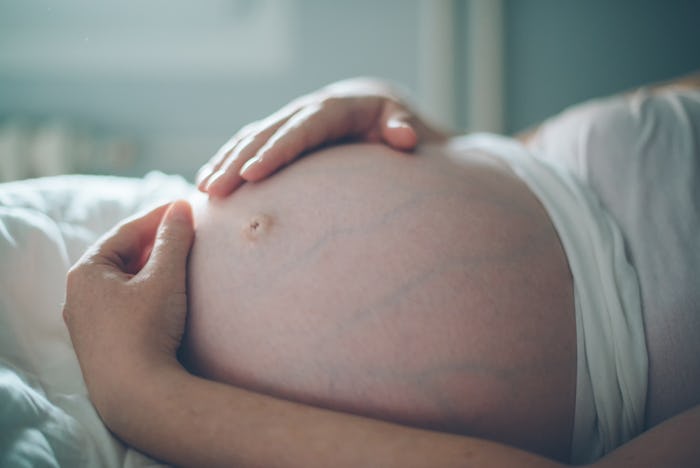Life

7 Things I Wish I'd Known About Braxton Hicks Contractions, Before I Experienced Them
When you think about the intense strain and the massive load of work required during labor and delivery, is it any wonder that your body needs to prepare? It made sense to me that, as I neared my due date, my would ligaments soften and my cervix would thin and dilate to get ready for childbirth, but it didn't occur to me that it would want to practice, too. But that's exactly what it does during false labor. That's just one of the things I wish I'd known about Braxton Hicks contractions before I actually experienced them.
I've been pregnant three times. This is the second pregnancy that I've carried to this point (28 weeks), but it's the first time I've experienced Braxton-Hicks contractions. When I get them, I can feel my uterus tighten for about 30-60 seconds. If I had to describe them, I'd compare them to menstrual cramps. Unlike real labor, these practice contractions are irregular, infrequent, and taper off on their own. As a result of their erratic nature, I never know when they're coming. I could by lying in bed, driving, or sitting in a coffee shop. In fact, I'm having them right now.
If you're not expecting them (and I certainly wasn't), your first Braxton-Hicks contractions can be disconcerting, to say the least. You'll get used to them, but it's best to know the following before that happens:
That They're Typical
Although not every woman gets them, Braxton-Hicks contractions are a completely typical and expected part of pregnancy. They neither cause labor nor are they necessarily a sign that labor is imminent. What is cause for concern and merits a call to your provider? Vaginal bleeding, fluid leaking, decreased fetal movement, and symptoms of true labor before 37 weeks.
I was pretty freaked out the first time it happened to me. The abdominal pain was unbearable, and I stayed awake all night debating whether or not to call the consulting nurse. When I shared my symptoms to the midwife the next day, I was relieved to hear her say that she wasn't alarmed by what I'd described.
That They Can Start As Soon As The Second Trimester
Although most common in the third trimester, Braxton-Hicks contractions can begin in the second trimester. Pregnancy Birth & Baby claims they can start as early as seven weeks, although you wouldn't be able to sense them. I guess I always assumed they were an end of pregnancy thing, but I've been feeling them since I was 21 weeks pregnant.
That They Can Be Really Painful
According to The Bump, many women don't even realizing they're having Braxton-Hicks contractions. For others, the experience can range from mild discomfort to outright pain. Mine aren't exactly subtle (my friend actually commented that she could see my belly tensing at dinner), and frankly, they hurt like a you-know-what.
That There Are Triggers
Wait. This is my fault? Well, not exactly, but you can prompt Braxton-Hicks contractions. Dehydration is a major culprit, but you can also get them due to a full bladder (or a full-blown UTI), having sex, engaging in strenuous exercise, or just overdoing it in general. According to the American Pregnancy Association (APA), someone touching a mother's belly can cause them, too. All the more reason to employ the "no touchy" rule.
That You Can Do Something About Them
If your false labor is particularly uncomfortable, like mine, you don't have to suffer in silence. You can find relief by changing positions, soaking in a warm bath, taking a walk, or doing relaxation exercises. In my experience, mindful breathing, although it won't stop contractions, does help you get through a bad bout of them.
That They're Different For A Second Baby
According to What to Expect, many first-time moms don't even notice their Braxton-Hicks contractions. I certainly don't remember having them with my first child. As a veteran pregnant person, you may be more in tune with what's going on with your body. But, honestly, pregnancy experts still don't know why mamas feel them more intensely the second time around — just that they do.
That They Serve A Purpose
Turns out Braxton-Hicks aren't just another annoying symptom that pregnant women have to put up with. I mean, you do have to put up with them, but they're doing some important work. Your practice contractions are toning your uterus, promoting blood flow to the placenta, and softening your cervix.
If I'd known that these pains in the backside (or more accurately, abdomen) were actually doing some of the early work of labor for me, I might have tolerated them a little better. I said might.
Check out Romper's new video series, Bearing The Motherload, where disagreeing parents from different sides of an issue sit down with a mediator and talk about how to support (and not judge) each other’s parenting perspectives. New episodes air Mondays on Facebook.